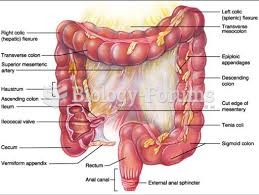|
|
|
Many medications that are used to treat infertility are injected subcutaneously. This is easy to do using the anterior abdomen as the site of injection but avoiding the area directly around the belly button.
Patients should never assume they are being given the appropriate drugs. They should make sure they know which drugs are being prescribed, and always double-check that the drugs received match the prescription.
Glaucoma is a leading cause of blindness. As of yet, there is no cure. Everyone is at risk, and there may be no warning signs. It is six to eight times more common in African Americans than in whites. The best and most effective way to detect glaucoma is to receive a dilated eye examination.
The heart is located in the center of the chest, with part of it tipped slightly so that it taps against the left side of the chest.
The first monoclonal antibodies were made exclusively from mouse cells. Some are now fully human, which means they are likely to be safer and may be more effective than older monoclonal antibodies.
 The Peary caribou is a relatively small and pale subspecies found in the tundra of far northern Nort
The Peary caribou is a relatively small and pale subspecies found in the tundra of far northern Nort
 Lestidae is a rather small family of cosmopolitan, large-sized, slender damselflies. They are of the
Lestidae is a rather small family of cosmopolitan, large-sized, slender damselflies. They are of the
 Diverticulosis. It is the presence of abnormal pouches in the wall of the large intestine (diverticu
Diverticulosis. It is the presence of abnormal pouches in the wall of the large intestine (diverticu




